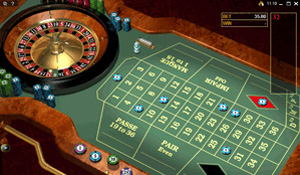If you’ve done any research at all into casino games, you’ll know that the outcomes of these games are based on odds and probabilities. While you don’t have to be a mathematical genius to gamble, knowledge of basic gambling maths will help you to choose the best bets when you visit the casino.
Here we’ll take a look at these basic principles as they pertain to odds at casinos, so that you better understand what you’re up against and can make the most profitable long term decisions when it comes to game and bet selection.
Probability
Probability is the likelihood that an event will occur. For example, in a game of roulette the probability that the ball will land on number 7 on a standard European Roulette wheel is 1:38 or a one in 38 chance. In gambling we refer to the odds of something happening or the odds against something happening. To use our roulette explanation – the odds against 7 winning will be 37:1. So it means that you’ll have 37 chances to be wrong and lose and one to be right and win.
Payout Odds
Every land based and online casino has specific payout odds. If you wager $/€/£10 in a game of blackjack and win with a blackjack hand, you will win $15. If you play a game with 3:2 odds you will earn $3 for every $2 you wager every time you win.
Similarly in a game of Roulette for every $/€/£1 you wager you on a specific number you will earn $35 if it wins (35:1 payout odds). Some casino games list their payout odds on the layout of the game as in Craps, or on the payout table as in some Video Poker games.
Upon inspection you’ll find that certain bets in some casino games often only payout at 1:1, also known as even money – this is the case in winning non-blackjack hands, the passline bet in craps or the red or black wager in a game of roulette. While other bets payout a rate greater than 1:1, like our roulette example above.
When payouts are expressed as “to” like “35 to 1” it means that you will win 35 coins/chips and have your original 1 coin/chip bet returned to you. The word “to” may also be substituted with “for” at some casinos, most often in the game of craps, for example odds will be posted at “30 for 1”. This means that you will earn 30 chips if your bet wins, but the casino keeps one, so the payout will be 29:1.
Payout Odds vs True Odds
We all know that the casino also known as the “house” has the edge in almost every bet at the casino, and that is due to the fact that casino payout less than the true odds of winning bets. In fact, the
In reference to our earlier roulette example we said that the odds of winning when betting on a single number like 7 will be 37 to 1. If the payout odds were the same as the actual odds, no house edge would exist. So by paying less than true odds at 35:1, the casino is ensuring an advantage and the house will keep 2 chips for every 38 wagered, giving it a 5.26% edge.
A few tips to keep in mind before placing your bets
- Just because a certain bet in a casino game offers higher payouts when it wins doesn’t mean it is a better bet.
- The closer the payout odds are to the true odds of any bet, the lower the house advantage.
- Beware of the word “for” used in payouts, it can be misleading. Remember you won’t win more because the casino will retain your original wager, lowering the return you get.
- Always play the wagers with the lowest possible house edge. As a general rule of thumb, stick to bets with a 1.5% edge or lower.




